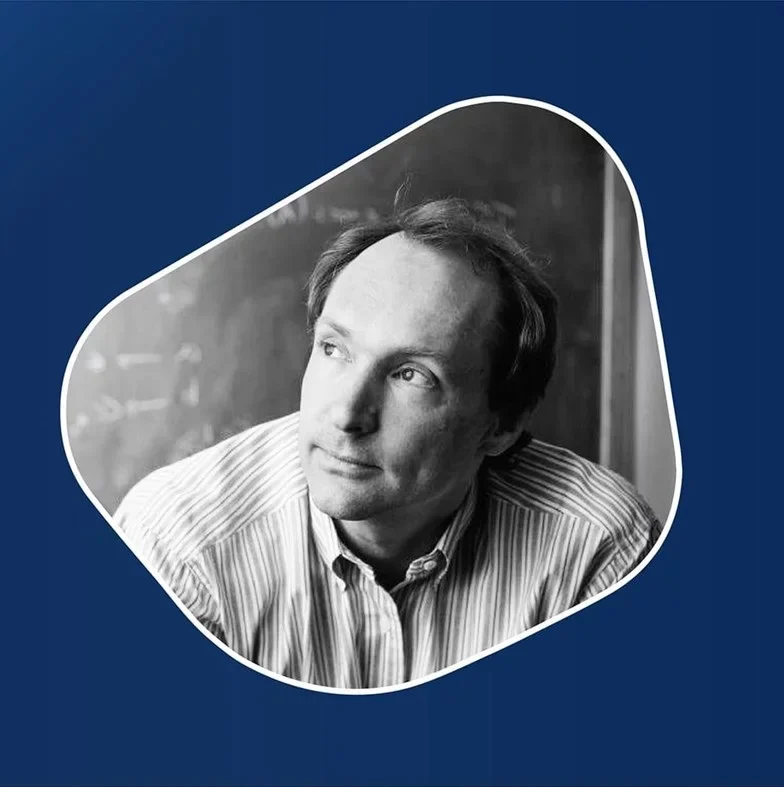
Never having profited off of his invention, Tim Berners-Lee not only created the connections possible for the internet we use today, he is also a fervent activist against the erasure of humanity.
Berners-Lee’s powerful contribution to the great technological rise began with his work as an independent contractor at CERN from June to December 1980. While in Geneva, he proposed a project based on the concept of hypertext, to facilitate sharing and updating information among researchers. To demonstrate it, he built a prototype system named ENQUIRE.
After leaving CERN in late 1980, he went to work at John Poole’s Image Computer Systems, Ltd, in Bournemouth, Dorset. He ran the company’s technical side for three years. The project he worked on was a “real-time remote procedure call” which gave him experience in computer networking. In 1984, he returned to CERN as a fellow.
In 1989, CERN was the largest Internet node in Europe and Berners-Lee saw an opportunity to join hypertext with the Internet:
“I just had to take the hypertext idea and connect it to the TCP and DNS ideas and—ta-da!—the World Wide Web.”
— Tim Berners-Lee
“Creating the web was really an act of desperation, because the situation without it was very difficult when I was working at CERN later. Most of the technology involved in the web, like the hypertext, like the Internet, multifont text objects, had all been designed already. I just had to put them together. It was a step of generalising, going to a higher level of abstraction, thinking about all the documentation systems out there as being possibly part of a larger imaginary documentation system.”
— Tim Berners-Lee
Berners-Lee proposed an information management system on 12 March 1989, then implemented the first successful communication between a Hypertext Transfer Protocol (HTTP) client and server via the Internet in mid-November. Berners-Lee is the director of the World Wide Web Consortium (W3C), which oversees the continued development of the Web. He co-founded (with his wife-to-be Rosemary Leith) the World Wide Web Foundation.
In 2004, Berners-Lee was knighted by Queen Elizabeth II for his pioneering work. He devised and implemented the first Web browser and Web server, and helped foster the Web’s subsequent explosive development. He currently directs the W3 Consortium, developing tools and standards to further the Web’s potential. In April 2009, he was elected as Foreign Associate of the National Academy of Sciences.
He was named in Time magazine’s list of the 100 Most Important People of the 20th century and has received a number of other accolades for his invention. He studied at The Queen’s College, Oxford, from 1973 to 1976, where he received a first-class bachelor of arts degree in physics.
Berners-Lee is one of the pioneer voices in favour of net neutrality, and has expressed the view that ISPs should supply “connectivity with no strings attached”, and should neither control nor monitor the browsing activities of customers without their expressed consent. He advocates the idea that net neutrality is a kind of human network right: “Threats to the Internet, such as companies or governments that interfere with or snoop on Internet traffic, compromise basic human network rights.” Berners-Lee participated in an open letter to the US Federal Communications Commission (FCC). He and 20 other Internet pioneers urged the FCC to cancel a vote on 14 December 2017 to uphold net neutrality. The letter was addressed to Senator Roger Wicker, Senator Brian Schatz, Representative Marsha Blackburn and Representative Michael F. Doyle.
The Alliance for Affordable Internet (A4AI) was launched in October 2013 and Berners-Lee is leading the coalition of public and private organisations that includes Google, Facebook, Intel and Microsoft. The A4AI seeks to make Internet access more affordable so that access is broadened in the developing world, where only 31% of people are online. Berners-Lee will work with those aiming to decrease Internet access prices so that they fall below the UN Broadband Commission’s worldwide target of 5% of monthly income.
“We demonstrated that the Web had failed instead of served humanity, as it was supposed to have done, and failed in many places,” he told me. The increasing centralization of the Web, he says, has “ended up producing—with no deliberate action of the people who designed the platform—a large-scale emergent phenomenon which is anti-human.”
From Here On Out…
With our Digital Maturity Index Service, one of our most important elements is the People dimension. To ensure the survival of humanity in business, we have developed this dimension especially to combat the issues our hero Berners-Lee references here. We are fundamentally committed to using technology and digital capabilities for the betterment of society, rather than its detriment. Curious? Get in touch.
Media networks without profoundly considering the consequences, Berners-Lee has spent the past three decades thinking about little else. From the beginning, in fact, Berners-Lee understood how the epic power of the Web would radically transform governments, businesses, societies. He also envisioned that his invention could, in the wrong hands, become a destroyer of worlds, as Robert Oppenheimer once infamously observed of his own creation. His prophecy came to life, most recently, when revelations emerged that Russian hackers interfered with the 2016 presidential election, or when Facebook admitted it exposed data on more than 80 million users to a political research firm, Cambridge Analytica, which worked for Donald Trump’s campaign. This episode was the latest in an increasingly chilling narrative. In 2012, Facebook conducted secret psychological experiments on nearly 700,000 users. Both Google and Amazon have filed patent applications for devices designed to listen for mood shifts and emotions in the human voice.
Sir Tim has received multiple accolades in recent years. These include receiving the first Queen’ Elizabeth Prize for Engineering in 2013, election as a Fellow of the American Academy of Arts and Sciences in 2009 and being knighted by H.M. Queen Elizabeth in 2004. He has received over 10 honorary doctorates, is a member of the Internet Hall of Fame, and was awarded the Finland Millennium Prize in 2004, and the A.M. Turing Award — often called ‘computing’s Nobel Prize’ — in 2016. In 2007, Berners-Lee was awarded the UK’s Order of Merit – a personal gift of the monarch limited to just 24 living recipients. In 2012, he played a starring role in the opening ceremony for the Olympics, where, in front of an audience of some 900 million, he tweeted: “This is for everyone”.

